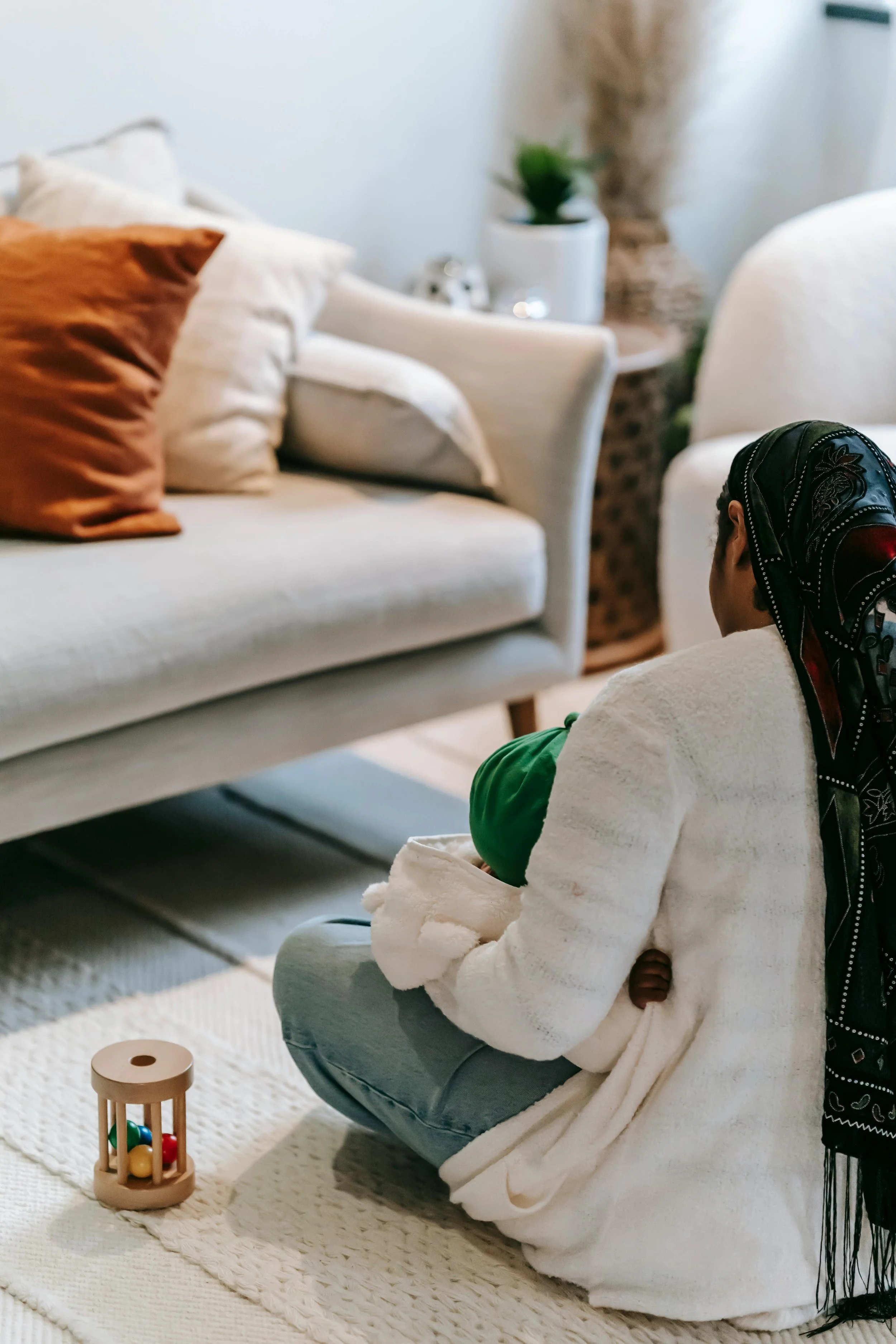Parenting With Boundaries - Even If Yours Were Never Respected
If you struggle to hold consistent limits with your child… or if you find yourself either too rigid or too lenient, you’re not failing.
You’re likely parenting without a clear internal blueprint for boundaries - and that’s incredibly hard.
For many cycle breaker parents, setting boundaries feels confusing, uncomfortable, or even wrong. Especially if you grew up with emotionally immature parents, where boundaries weren’t just ignored - they were punished.
When Parenting Feels Like You’re Never Doing Enough
If you find yourself constantly second-guessing your parenting decisions, feeling guilty for losing patience, or lying awake wondering if you’ve “ruined” your child’s day… you’re not alone.
This kind of parenting guilt is common - especially if you’re trying to do things differently from the way you were raised.
But for many cycle breaker parents, it goes deeper than everyday self-doubt.
It becomes a constant internal narrative: I should have handled that better. I’m failing. I’m turning into them.
So why does the guilt feel so intense when you’re parenting after childhood trauma?
When Your Child’s Emotions Trigger Your Wounds
You’re in the kitchen, your child starts crying - and suddenly you feel it. That rising heat in your chest. The overwhelm. The urge to shut it down or walk away.
You don’t want to react. You know they’re just expressing big feelings.
But your body’s already in fight-or-flight.
If this sounds familiar, it doesn’t mean you’re a bad parent.
It means you’re a triggered parent - one who’s doing the incredibly brave work of parenting after childhood trauma.
“I Swore I’d Be Different”
If you were raised by emotionally immature parents, you didn’t get a healthy template for love, boundaries, or emotional regulation. Now, you’re trying to break that cycle while still healing from it - and that’s more than just parenting. That’s recovery work.
What Healthy Boundaries Actually Look Like
We talk about “boundaries” a lot these days - especially in therapy circles. But despite how common the word has become, many people I work with still feel unsure about what boundaries actually are, let alone how to recognise or set them in their own lives.
“But They’re Still My Mum/Dad”
There’s a sentence I often hear in therapy, usually accompanied by a mix of guilt and confusion:
“But they’re still my mum.”
“But he’s still my dad.”
It usually comes after someone has started recognising that their parent might not have been as emotionally available, respectful, or safe as they once thought - or hoped. There’s a dawning awareness that things need to change. But just as quickly, guilt rushes in to shut it down. The idea of creating distance, saying “no,” or prioritising your own wellbeing feels impossible when that deeply ingrained narrative kicks in: You only get one mum or But they’re family.
The Inner Critic: Whose Voice Is It Really?
We all have an inner critic. That little voice in your head that says, “You’re not doing enough,” or “Why can’t you just get it right?” It shows up when you’re already feeling low, or when you’re about to take a risk that matters. It piles on when you’re struggling. And sometimes, it sounds so familiar, so automatic, that you hardly notice it’s there.
From “Not Good Enough” to “Too Much”
Growing up with emotionally immature parents often means growing up with some confusing, painful beliefs about yourself.
You might find yourself feeling like you’re never quite enough for people … but also somehow way too much at the same time.
It’s exhausting - and it’s not your fault.
Shame: The Emotion That Wasn’t Yours To Carry
Shame is one of those feelings that can stick to you like glue - quiet, heavy, and hard to name.
You might not always notice it’s there, but it can show up in your inner voice, your relationships, and the way you see yourself.
If you grew up with emotionally immature parents, there’s a good chance you’ve been carrying shame that was never truly yours to begin with.
Healing From Emotional Neglect
Realising that you experienced emotional neglect growing up can bring up a lot of mixed emotions; relief, sadness, anger, even confusion.
You might find yourself wondering, “Now that I know… what do I do with this?”
How Emotional Neglect Shows Up in Adult Relationships
When we think about childhood emotional neglect, it’s easy to focus only not he past. But the trust is, its effects often follow us into adulthood - especially into our relationships.
Signs Your Might Have Grown Up With Emotional Neglect
Emotional neglect can be incredibly difficult to recognise, especially because it’s about what didn’t happen. You may have grown up in a house that seemed loving, with no major problems - yet still feel like something vital was missing.
If you often feel disconnected from your emotions, relationships, or sense of self, emotional neglect might be part of your story. So let’s dive into it together.
What is Emotional Neglect?
When we talk about childhood neglect, most people imagine the obvious; not being fed, clothed, or cared for.
But emotional neglect can be much more subtle. And because it’s so invisible, many people don’t even realise it happened to them - let alone anyone else.
Letting Go of Obligation
Do you ever catch yourself saying yes to your parents out of guilt or a sense of obligation - even when you’re exhausted, busy, or just don’t want to?
Maybe you rearrange your schedule, suppress your needs, or bite your tongue to “keep the peace”.
If so, you’re not alone.
How to Protect Your Peace in Difficult Family Dynamics
Navigating family dynamics can be challenging, especially when dealing with emotionally immature parents. You might find yourself caught in frustrating conversations, feeling drained after every interaction, or questioning whether you’re being unreasonable for wanting healthier boundaries. The truth is, protecting your peace isn’t selfish—it’s essential. In this post, we’ll explore why boundaries matter, phrases to help you navigate tricky conversations, and how to stand firm without guilt.
The Difference Between Healthy and Toxic Guilt
Guilt is a natural emotion that plays a crucial role in our moral and emotional development. When experienced in a healthy way, guilt helps us recognise when we have made a mistake, encouraging us to make amends and grow as individuals. It strengthens relationships by promoting empathy, accountability, and ethical decision-making.
Why Saying No to Your Parents Feels Impossible—And How to Change That
If you’ve ever found yourself saying “yes” to your parents even when every part of you wanted to say “no,” you’re not alone. Many adults who grew up with emotionally immature parents feel an almost instinctive pressure to comply—whether it’s agreeing to a last-minute request, accepting unwanted advice, or sacrificing their own needs to keep the peace.
Breaking Free from the Role of Family Caretaker
If you grew up feeling like it was your responsibility to keep the peace, manage emotions, or even take care of your parent's needs, you’re not alone. Many adults find themselves stuck in the role of the family caretaker long after childhood. It’s exhausting, unfulfilling, and often unfair—but breaking free from it can feel impossible.
How Parentification Impacts Adult Relationships—And What You Can Do About It
If you grew up shouldering responsibilities that weren’t yours—whether that meant caring for younger siblings, managing household tasks, or acting as your parent’s emotional support system—you likely experienced parentification. At the time, you may not have even realised it was happening. It was just “normal.”
Forced to Grow Up Too Fast? Understanding Parentification
If you spent your childhood feeling more like a caregiver than a child, you might have experienced parentification—a role reversal where a child takes on responsibilities that should have belonged to an adult.
Maybe you were the one making sure your younger siblings were fed and dressed for school. Maybe you found yourself calming down your parent after their bad day or acting as their emotional support system. At the time, it may have felt normal—or even like something to be proud of. But the truth is, being forced to grow up too fast has lasting effects on your emotional well-being, self-worth, and relationships.






















